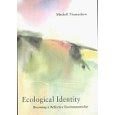
On returning from a short jaunt on snowshoes in the Unity woodlot, I spotted some Snow Buntings. It took me some field guide work (and consultation with Professor Dave Potter) to confirm what I saw. Ever since I got out the field guides, they've stayed out. I've tried to find a little bit of time every day to study a small section of a different field guide. I realize that I do this annually, usually in the dead of winter. I get an uplifting feeling as I flip through these magnificently illustrated books. It's a reminder that Spring will be here.
As a young boy, I would practice a similar ritual with my baseball cards. In the late 1950's the new series of Topps cards usually wouldn't be in the stores until March. So I would retrieve the previous year's cards and sort them out on the floor of my room. By late January, the sun is higher in the sky and you know that Spring lies out there somewhere. Probably if I had spent as much time then studying birds as I did baseball cards I would be a much more skilled birder than I am. But instead I remember that Duke Snider hit 42 home runs in 1955 and I can call up other such useless trivia.
No matter. I didn't really take notice of birds (the way birders do) until I was in my late twenties. And I remain a casual birder. During spring migration, or when I travel to distant places, or when I have spring fever, I get out the bird guides, carry my binoculars with me, and do the best I can to observe and pay attention, hoping that with each new excursion, my atrophied skills will somehow be resurrected.
Truth be told, I'm not a very skilled birder. I find it difficult to move from a pure viewing field to the binoculars and back again.
I don't attend to or notice detail particularly well as I have always been more of an observer of patterns and systems. And I'm impatient in the field. I'm easily distracted and ready to move on to the next new thing. These are all reasons why the patient perseverance of birding is so crucial for my ecological awareness.
Here are some reasons why I enjoy birding when I have an opportunity to do it.
(1) Birding slows down my hyper-reflective always thinking/moving mind, and helps me achieve a more refined state of pure observational awareness. Birding forces me to focus on the observational moment.
(2) It teaches me about the remarkable variety, mystery, and wonder of life on earth. Each species has a unique life story, an adaptive radiation, an ecological strategy, a biogeographical space, a behavioral response, and a perceptual accommodation. I respond to this diversity with unbridled enthusiasm.
(3) While observing birds in their habitats I am inevitably drawn to other aspects of the landscape which I now see through the movement of the birds.
(4) I enjoy looking up birds in field guides. I find these guides reassuring in that they can pack so much information and diversity into a book that you can carry in your pocket. Yet they tell only a sliver of the story. Indeed, the drawing, the text, the photo, and the map are all approximations. There is a compelling narrative that lies within, between, and beyond the page. I take pleasure in perusing multiple field guides, each reflecting a different descriptive strategy, all somehow comprehensive yet incomplete. Perhaps these field guides reassure me that despite anthropogenic planetary changes, these birds (for now) are still here!
(5) I enjoy the gaming and sporting aspect of birding. I take pleasure in seeing a "new" bird and adding it to my list, not in an obsessive way, but more in the sense of finding a jewel or uncovering treasure. How appealing it is when a bird I've never seen before reveals itself to me!
(6) I revel in the hide and seek element. Sure there is a stalking, prey/predator Pleistiocene origin to this. But I think of it more as a subtle game of search and discover. Still, the bird plays by its own rules.
(7) I adore the improvisational aspect—how you take a walk, or sit in a spot, and sometimes without warning, a mixed flock of birds appears, often at various layers of the landscape, and you have to figure out where they are, where they are moving, and how you can blend into the landscape well enough to observe them.
(8) Birding teaches me to come out of myself and into the natural world.
(9) Birding teaches patience.
(10) Birding teaches me to listen to the sounds of nature, paying attention to the basic elements of musical sound—call and response, mating and attraction, notification and warning, or as David Rothenberg points out in his lovely book Why Birds Sing, singing for the sheer heck of it.
(11) I enjoy the collecting aspect of making a list, with the impermanence attached to collecting something that you can't own or put on a shelf.
There's much more to reflect on here. If you're interested in the deeper meaning of birding, I strongly encourage you to read Jonathan Rosen's absolutely brilliant and evocative book, The Life of the Skies: Birding at the End of Nature. Rosen's learned and passionate account moves from spirituality to the history of human/nature relationships, through Louisiana, Israel, and Central Park. His work embodies so much of how we think about our relationship to nature. And he's a terrific storyteller.
But for now, and for the purposes of this blog (Environmental Studies for the Real World) and in service of ecological learning, I wish to say that through the crises of climate change and biodiversity and our urgent rush to promote sustainable alternatives, birding ought to be at the heart of environmental studies. I can think of no better way to learn to observe nature and I can think of no more virtuous and vital learning opportunity than observing birds.





1 comment:
Honestly speaking, I have never found such an amusing blog! You touched my heart with truly attractive articles with catchy titles... Our custome writing can extend your audience by adding more exclusive content!
Post a Comment